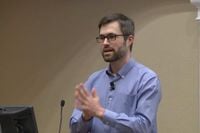Dr. Mark Bray, a Rutgers University professor and historian renowned for his expertise on anti-fascist movements, has become the center of a fierce controversy that has sent shockwaves through the academic world and beyond. On October 9, 2025, Bray and his family attempted to flee the United States for Spain following a torrent of death threats, a move that has reignited the national debate over academic freedom, campus activism, and the limits of political discourse in an increasingly polarized America.
Bray’s ordeal began in earnest when the Rutgers chapter of Turning Point USA, a conservative student organization, launched an online petition demanding his removal from the university. The petition, which quickly garnered over 1,500 signatures, labeled him a "well-known antifa member" and accused him of being a "financier" for left-wing activism. The spark for this campaign was not only Bray’s academic focus but also his 2017 bestselling book, Antifa: The Anti-Fascist Handbook, which the petition described as influential among communist and anarchist groups. Notably, 50% of the book’s proceeds were donated to the International-Fascist Defense fund, which Bray has explained supports “the legal or medical costs of people facing charges for organizing pertaining to anti-fascism or anti-racism,” according to The Guardian.
Bray, who has taught courses on anti-fascism and terrorism at Rutgers since 2019, has repeatedly denied any membership or direct involvement with Antifa groups. “My role in this is as a professor,” Bray told The New York Times. “I’ve never been part of an antifa group, and I’m not currently. There’s an effort underway to paint me as someone who is doing the things that I’ve researched, but that couldn’t be further from the truth.” Despite his assertions, the campaign against him intensified, especially in the wake of the assassination of Turning Point USA founder Charlie Kirk. The alleged assassin, Tyler Robinson, was reported to have left anti-fascist resistance messages engraved on bullets, further fueling tensions.
As the petition circulated, Bray’s home address was posted online—a practice known as “doxxing”—and the threats against him and his family escalated dramatically. According to The Washington Post, at least one threat explicitly stated an intent to kill Bray in front of his students, prompting the professor to switch his classes to an online format to protect student safety. The situation became so dire that Bray reported the threats to Rutgers University and filed a police report. The university offered additional security for his classroom, but Bray felt these measures were insufficient.
On October 9, Bray and his family attempted to depart from Newark airport, only to find their flight reservations mysteriously canceled—a development Bray described as "very mysterious and, in my opinion, fishy." Despite this setback, the family managed to leave for Spain the following day, where Bray now plans to teach his classes remotely for the rest of the semester.
The controversy has drawn strong reactions from all sides. Todd Wolfson, president of the American Association of University Professors and a Rutgers faculty member, condemned the threats against Bray in a public statement: “There is no place in American higher education for death threats against professors. We stand with Professor Bray against this gross assault on academic freedom and freedom of speech.” Many of Bray’s colleagues have echoed this sentiment, criticizing the Turning Point USA petition as an attempt to “suppress the speech, teaching and scholarship of faculty who do not conform to their movement’s politics.” In a joint statement, faculty members called the petition’s targeting of Bray “an affront to both academic freedom and Turning Point’s self-proclaimed commitment to a culture of open debate.”
Rutgers University itself has tried to walk a careful line, issuing a statement that read, in part: “Rutgers is committed to upholding the rights of students and faculty to free speech and academic freedom as fundamental to our community.” The university declined to comment on specific personnel matters but emphasized its commitment to providing a secure environment for all members of its community.
Turning Point USA’s Rutgers chapter, for its part, has disavowed the harassment and doxxing of Bray, stating it “does not support the harassment or doxxing of Dr. Bray or of anyone else,” in what appears to be an effort to deescalate the situation. However, the group’s president, Michael Joseph, maintained their stance that Bray should be removed from his position, stating, “Mark Bray is a coward, fundamentally. He thought he could hide behind his books. He thought he could hide behind his degree and radicalize kids from the safety of his classroom.”
The controversy has not only exposed deep divisions on campus but has also drawn in national political figures. President Donald Trump, in the week leading up to Bray’s flight, signed an executive order seeking to classify Antifa as a domestic terrorist organization. Trump and his supporters argue that “radical left rhetoric” has contributed to a spike in political violence, while critics have denounced the move as a “witch hunt against Trump’s political adversaries.” Bray himself has been outspoken about what he sees as the dangers of such broad labeling, writing on Bluesky, “I could say that antifa is neither ‘terrorist’ nor an ‘organization,’ but MAGA does not care about facts…this is just about mobilizing a broad label to expand repression and accelerate the march to fascism.”
For many students at Rutgers, the ordeal has been a sobering reminder of the real-world consequences of political polarization. “I think it’s kind of embarrassing that people are treating somebody like this just for their own opinions,” said student Alexandra Haines to CBS News New York. Another student, Andrew Manrique, added, “It’s kind of crazy and it’s scary.”
Meanwhile, the backlash has not been limited to Bray’s critics. In response to the threats against him, a new petition has been launched calling for Turning Point USA to be expelled from campus, accusing the group of “continuously promoting hate speech and inciting violence.” Bray is also one of hundreds of professors included on a Turning Point USA watchlist, which tracks faculty members accused of left-wing bias or activism.
As the debate continues, Bray’s situation highlights the precarious balance between academic freedom, campus safety, and the heated rhetoric of contemporary American politics. While he and his family now seek safety abroad, the reverberations of his case are likely to be felt on campuses and in political circles for months, if not years, to come.



